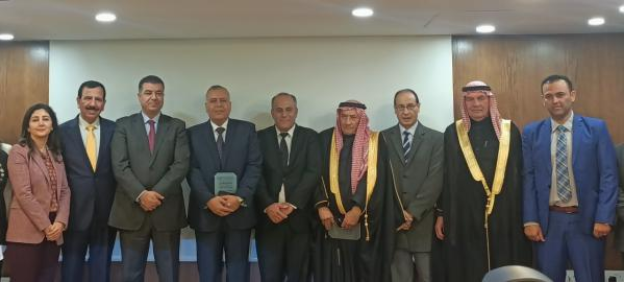Ministry of Agriculture: Signing an agreement with 20 farmers working in the lands along the Zarqa River to produce fodder crops and create new farming opportunities

Under the patronage of the Minister of Agriculture, Eng. Khaled Al-Hunaifat, and in the presence of the Governor of Zarqa, Hasan Al-Jabour, the Arab Jordanian Company for the Development of Water, Agriculture and Land Projects (AJC), represented by Dr. Walid Al-Masri, signed 20 agreements with farmers working in the lands extending along the Zarqa River.
This agreement came as part of an initiative to encourage fodder plantation through Zarqa Governorate, Zarqa Agriculture Directorate, and Zarqa Farmers Union and as part of the Ministry of Agriculture’s plan to direct crops along the Zarqa Stream to fodder, and as a continuation of the Smart DESERT Project efforts in encouraging fodder planting.
The agreement aims to help farmers produce fodder crops and create new farming opportunities according to the instructions of the Jordanian government, while securing sales of their produce.
The Smart DESERT Project, funded by the French Development Agency (AFD), supported AJC by establishing a silage production line with the aim of supporting farmers in increasing their income, reducing their production costs and raising the purchasing value of agricultural products.
Al-Hunaifat stressed that the Ministry of Agriculture is working according to a plan to direct farmers working along the Zarqa River towards fodder to meet local demand, and to create income for farmers after preventing all plantation of vegetables of all kinds along the stream. This is considered investing in water in light of climatic changes and scarcity of rain, which will lead to creating job opportunities by supporting farmers, in addition to achieving profitable income for farmers.
Caroline Haddad, Blumont Jordan Country Director, thanked AFD for its continuous support of Smart DESERT project, and said: “We established a silage production line based on the vision of the Project to increase the income of Jordanian farmers and Syrian Refugees, create new job opportunities, and provide services stemming from the needs of farmers in the area”.
Eng. Ali Hayajneh, Smart DESERT Project and Director of the Water and Climate Change Program at the International Union for Conservation of Nature, said: “The initiative to support and convert farmers to fodder crops is part of the relentless efforts undertaken by the project to adopt the correct methods in agriculture and benefit from treated wastewater in agriculture, especially in planting fodder that is compliant to the required standards and specifications. In addition to that, the Project adopts creative ideas that maximize the benefit from available sources at the lowest costs and in a manner that is more compatible with climate change and the challenges facing the agricultural sector in general.
The Governor of Zarqa, Hasan Al-Jubour, thanked Blumont Jordan Country Director, and AJC Director, Dr. Walid Al-Masri, the Directorate of Zarqa Agriculture and the President of the Farmers Union for this The initiative to encourage fodder plantation through the Smart Desert project”.
The Governor noted the development challenges in the city of Zarqa in the agricultural sector, namely the scarcity of water and the heavy reliance on the Zarqa River and the fact that its water is constantly exposed to pollution.
He emphasized the role of the Ministry of the Interior, and the Ministry of Agriculture to find an alternative solution and achieve government strategic goal through achieving sustainable local agricultural and animal production and more productive efficiency for the period between 2023 -2027.
Daifallah Al-Amoush, Chairman of the Zarqa Farmers Union said: “This initiative is important as it encourages us to grow what we import from abroad, such as silage. It will have a significant impact on the national economy and on farmers in terms of income, as it has been proven that fodder crops that will be processed into silage are more feasible than traditional crops and are easy to market locally”. Dr. Walid Al-Masri, General Manager of AJC said: “This initiative came in line with His Majesty vision to find alternative solutions suitable for agriculture, including fodder cultivation. We thank and appreciate the efforts of Smart DESERT Project by providing us with a silage production line to cultivate large quantities of fodder corn and other fodder crops that are irrigated from treated water under the specification
No. 893/2021 for environment and agriculture. The project serves farmers and guarantees the sale of their crops within market prices and special prices for cow farms”.
Smart DESERT Project is a pilot-project financed under the Minka Peace and Resilience Fund, dedicated to reducing vulnerabilities and long-term effects of the Syrian refugee crisis in host countries. France, through the AFD, allocated a 10M€ grant to the Smart DESERT Project.
The Smart DESERT project aims at creating a paradigm shift in the agricultural sector in Jordan by improving the regularity of the Jordanian and Syrian beneficiaries’ income throughout the year in the North-East Badia Highlands through the diversification of production, the adoption of better farming practices and support for employment.
The project also aims to support the improvement of working conditions for agricultural workers and will focus on smart farming, efficient irrigation, proper crop selection, use of non-conventional water resources, and meeting market requirements.
The project is implemented by IUCN in partnership with Blumont, Horizons for Green Development, Greentech, and Inter-Islamic Network on Water Resources Development and Management (INWRDAM).
It is worth mentioning that the Smart DESERT Project will reach young entrepreneurs and trainees through direct and indirect capacity-building programs, and support 500 agricultural home based businesses and 200 farms in the North-Eastern Badia Highlands.